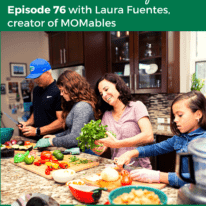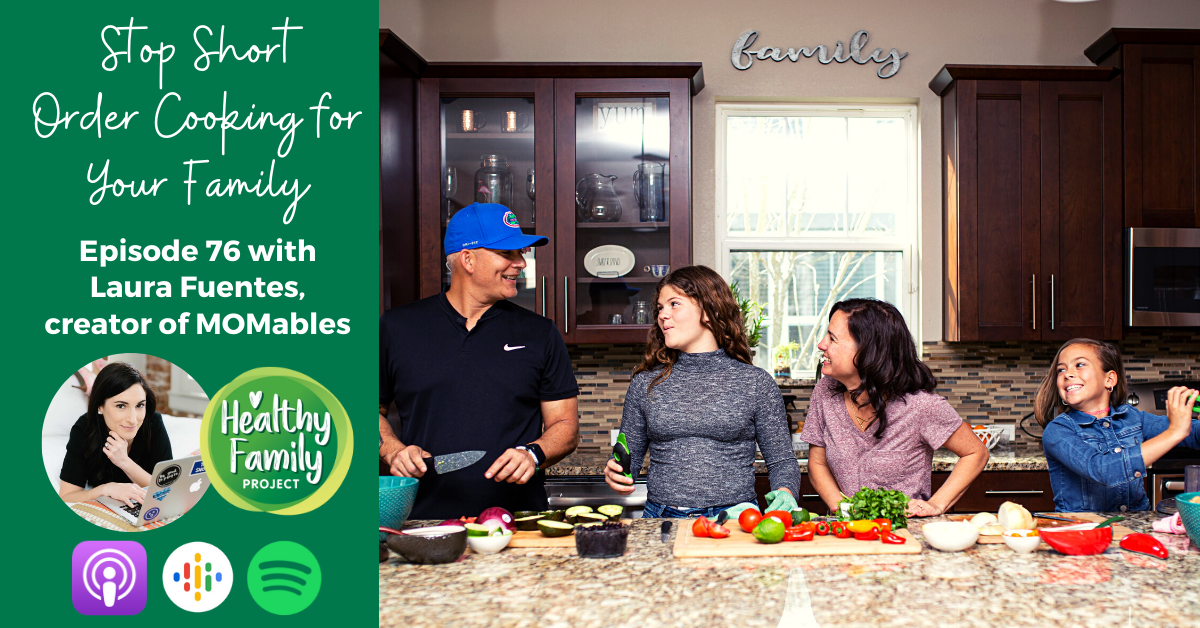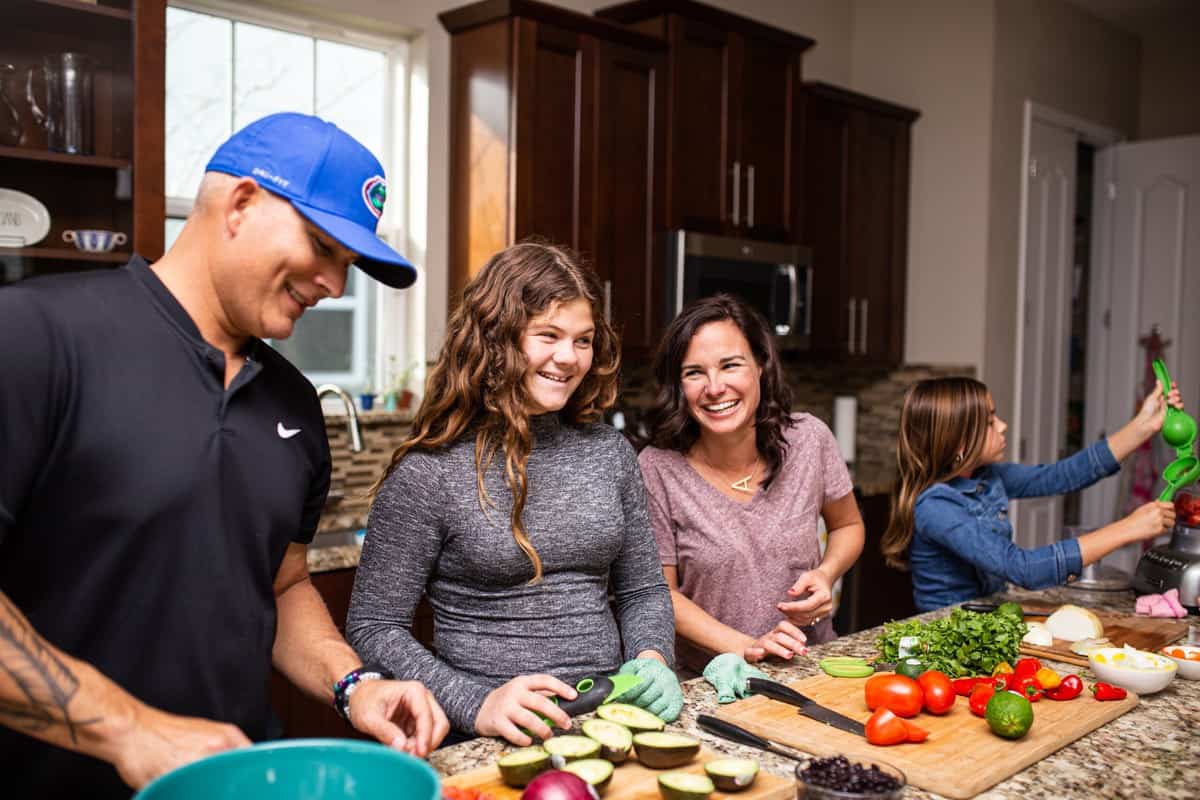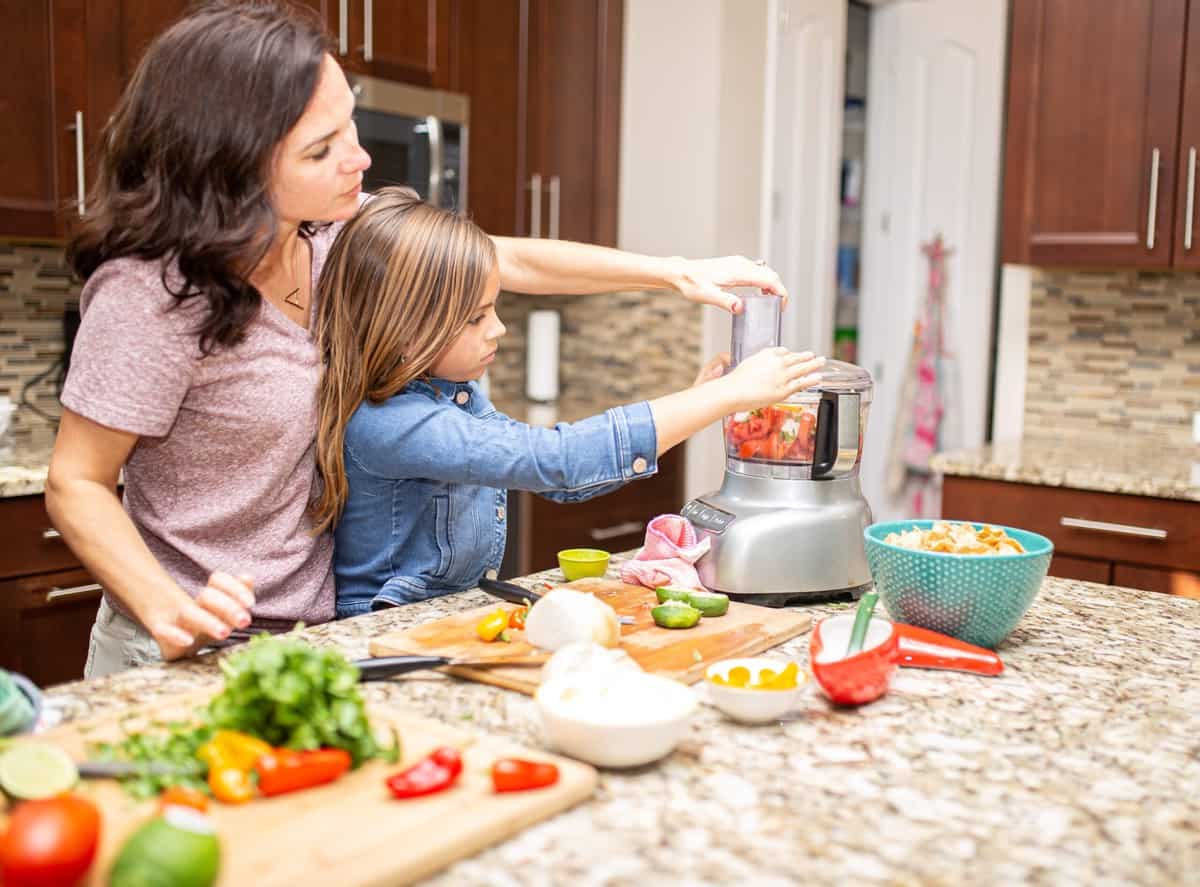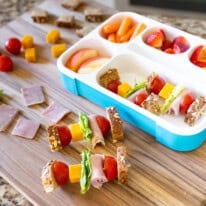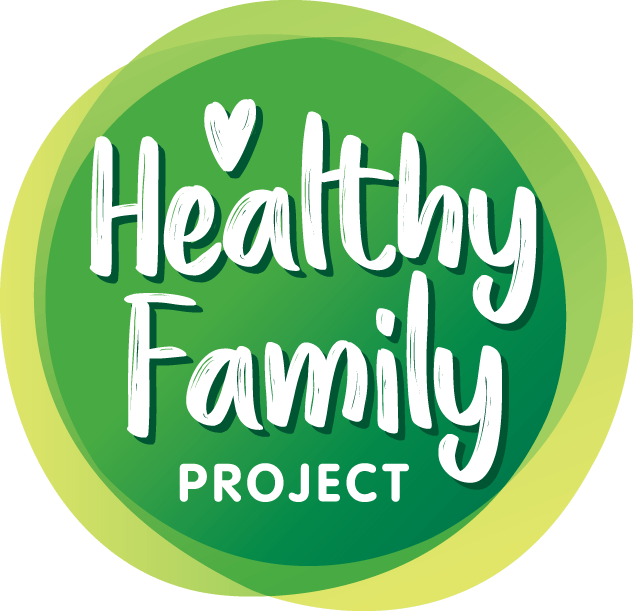Episode 76: How To Stop Short Order Cooking For Your Family
On this episode of the Healthy Family Project Podcast, we’re joined by Laura Fuentes, creator of MOMables, to discuss short order cooking and steps families can take to avoid it and make mealtime stress-free. We covered how to set boundaries and improve family communication, how to ease into meal planning, and tons of kitchen hacks to save time and make cooking less overwhelming.
As busy parents, we’re often pulled in a million directions between work, school, extracurricular activities, driving kids around, on top of all of our daily tasks. Time and time again, we hear from parents who find themselves feeling stressed spending way too much time in the kitchen cooking different meals for their selective eaters while trying to meal prep and pack lunches for the week.
We’re here to discuss how parents can cut back on the constant short order cooking and transform mealtime to balance their kids’ food preferences without defaulting into cooking 3+ meals every night. Spoiler alert: it’s totally possible and throughout the episode, you’ll hear lots of tips and strategies to make mealtime work for your family in a way that reduces stress, kitchen clean up and time spent cooking.
Through strong communication, simplifying your approach to meal planning, maximizing your time and inviting your kids into the process, you can make huge strides in transforming mealtime. As you embark on this journey, remember that it’s okay to fail and trial and error is a huge part of the process. Every little win counts and along the way you’ll discover tons of tricks that work for your family.
About Our Guest, Laura Fuentes
Laura Fuentes is the creator of MOMables, where she’s helped thousands of families improve their health and wellness by establishing healthier eating habits as a family with her Family KickStart Program and Weekly Meal Plans.
She’s the Author of 5 Cookbooks, a successful entrepreneur, public speaker, spokesperson, makes regular television appearances like on TODAY and Good Morning America, has competed on Food Network and won! Her 100K + YouTube subscribers make her an “official YouTuber” according to her 10-year-old that is.
Laura is bilingual, born and raised in Spain, and currently lives outside of New Orleans with her husband and 3 kids. In her spare time, Laura reads, sleeps, and works out. What she loves most is taking her family on travel adventures.
Listen to How To Stop Short Order Cooking For Your Family
What We Cover:
Want to skip straight to a hot topic? See timestamps below. But of course, we recommend listening all the way through to get all the great tips and tricks!
- 2:48 Get to know Laura!
- 12:15 How to transform mealtime
- 13:44 Family communication tips
- 16:30 How to delegate to your kids
- 19:46 Tips to start short-order cooking
- 29:11 How to incorporate new flavors
- 37:00 Meal Plans
- 44:22 Laura’s easy staple weeknight recipe
Relevant Links
- Check out Laura’s Website
- Follow @LauraSFuentes & @MOMables on Instagram
- Laura’s family-friendly weekly meal plans
- Download the FREE Busy Mom’s Guide to Living Your Best Life
- How to Stop Short-Order Cooking for Your Family
- Laura’s Baked Chicken Thigh Recipe
- 23 Quick & Easy Sheet Pan Dinners
- Meal Planning Tips + FREE Grocery List Printable
- 50 Easy Dinners Ready in 30 Minutes or Less
Other Podcast Episodes to Check Out:
- Episode 72: How to Create a No Stress Dinner Plan
- Episode 45: Conquering Family Mealtime Struggles
- Episode 21: Meal Planning & Cooking with Kids
Healthy Family Project Facebook Group
Join our Healthy Family Project Facebook group! This group will serve as a safe space for parents and caregivers to talk all about raising a healthy family – from dealing with a picky eater and tips to get more fruits and veggies onto plates to exercising as a family and mental health. We welcome all of you to join in!
Listener Survey!
Thank you so much for supporting the Healthy Family Project Podcast! We’d love it if you could take 5 minutes to let us know how we can bring you the best possible content for future episodes. Take the survey here.
Healthy Family Project Podcast
Conversations covering hot topics in the world of health, food and family with a dose of fun. Helping families ease their way into a new fresh and healthy world.
Be on the lookout for new bi-weekly episodes and don’t forget to subscribe on Apple Podcasts, Google Podcasts, Spotify or your favorite podcasting site. If you like an episode, make sure to leave a rating and comment.
If you are interested in being a guest on the Healthy Family Project podcast, contact amanda@healthyfamilyproject.com with your topic idea for consideration.
Transcript for Episode 76
This transcript was produced by Otter.Ai. Please forgive any misspellings and grammatical errors.
00:09
Welcome to the healthy family project podcast covering the hot topics in the world of health, food and
family with a dose of fun. Welcome to the healthy family project podcast. I’m your host Amanda and I am
extremely happy to have you with us today. We have a great topic coming up. But before we get started
wanted to remind everyone about the healthy family Project Facebook group, where we continue the
conversation from the podcast, and also share thoughts ideas, not just all food, different, you know, tips
and help asking for help. That’s a big one. So it’s always interesting to see the conversations happening
over there and join in with those. And also we added some new recipes to our website recently healthy
family project.com and hope if you end up making any of these if you’re the type that likes to show off on
his show the recipes off on Instagram, we love it, you can tag us and also even just let us know if you try
something how it turned out. We do have a recipe rating system on the website and an area where you
can comment anything you know about the recipes that you are trying out. So today we are talking with
Laura Fuentes. Laura is the creator of mama bowls where she’s helped 1000s of families improve their
life and wellness by establishing healthier habits as a family with her family Kickstart program, and
weekly meal plans. We love a good meal plan over here so awesome. She’s the author of five
cookbooks, a successful entrepreneur, public speaker spokesperson and makes regular television
appearances on shows like today and Good Morning America. She has competed on Food Network and
one and her 100,000 Plus YouTube subscribers make her an official YouTuber, according to her 10 year
old that is. So Laura is bilingual, born and raised in Spain and currently lives outside of New Orleans with
her husband and three kids in her spare time Laura reads, sleeps and works out what she loves most is
taking family travel adventures. So today’s topic is how to stop being a short order cook. I think this is
relevant to many of us whether you’re a short order cook for your family, on you know, whatever level
level that might be, whether it’s just a couple times a week, or if it’s you’re in deep. So Laura is going to
help us out with that topic today. And let’s get started. Welcome, Laura to the healthy family project
podcast. I’ve been a fan of yours for some time now. And I’m super excited to have you on the show. Can
you tell the listeners a little bit about you?
02:56
Thank you for having me here. Amanda. I, we it’s been such a fun journey just to get here and share this
information with your listeners. But as you know, part of the journey is just as fun as it is, you know the
ups and downs of being a parent, I am a mom to three kids. And since 2011, which I feel like I’m a
dinosaur in this whole social media online world don’t say that. It’s just like, you know, you’ve been doing
it a long time. I know. When I first started, my kids were younger, and I really struggled with trying to
figure out what to pack for lunch. That’s why the name mama bulls, because I started making healthier
versions of Lunchables. And my daughter would call them a marble. And so I one day decided, You know
what, I’m going to share what I do online so that the parents in her class, don’t always ask, Hey, do you
have a recipe for this, you have a recipe for that. And I just found myself like testing things, learning how
to cook for my family. And so I started mama bowls as a way to document what I was making for her.
And lo and behold, people started coming people that struggled with what to pack for lunch for their kids.
And that’s really kind of like how I started that catapulted into my first cookbook, the best homemade kids
lunches on the planet and I’ll have five but really trying and you know, not being afraid of failing in the
kitchen a lot because my background is in global economics. So I am not a trained chef. I have an MBA,
I work the corporate world so I was not very domesticated when I first started this whole parenting
journey, right like I was really hesitant because I want it to be a good mom like all you know all of us out
there. And so I really began by sharing right off the gecko not what I did great, but what I struggled with
every single De which was making meals that my family would eat because I also have a very, I have
three kids and my middle son gave me a run for his money and my money. When it comes to meal times
and picky eating, I spent seven years in therapy with him, from you know, nutritionists to feeding therapy
to, in and out of doctor. So our journey has been adventurous at best. But on the plus side, I have
learned so much. And it really, I’m still learning. And I still share all of that in my cookbooks, on the
recipes that I create online on my YouTube channel. Because I feel like if I can just help one family, you
know, with their healthy eating journey, maybe overcome picky eating, maybe just literally get started with
meal planning, you know, like, eliminate the overwhelm and simplify some of those things for them. I’m
here for it.
05:56
Well, and it’s interesting, because I’ve had several guests on the show that their journey starts similarly,
where they’re struggling with something, and they go into whatever it might be, because it’s a struggle for
them. And then they start getting other people having questions, and it’s a way to share information, and
then it just, you know, becomes this amazing, awesome thing. It’s such a resource for so many people.
So very cool. So today, we are talking about how to stop being a short order cook for your family, oh, my
gosh, I am so guilty of this. As much as I’d like to say I’m not, it’s one of those things. I’ve had this
conversation several times recently, where I said, when my kids were born, you have this vision, you’re
like, they’re going to eat this, and they’re gonna do this, and they’re gonna be like this, and then this will
happen. And really none of that really ever. That’s not how it works. I should know that trying to have a
plan like that is, you know, not the way to go. There’s already a plan in place. So my oldest has always
been adventurous eater. And I was really lucked out with her. She wanted to try everything. I mean, she
was wanting to eat sushi, like three years old, it was wonderful. I felt like I was winning. And then my
second came along. And she was a little different. So complete opposite. We’ve come a long way. Like,
like you’re saying you’ve had a journey. We’ve also had our own journey. And I’ve learned a lot and I
think she’s learned a lot along the way. I do find myself not as often now, because I think I’ve, I’ve
developed kind of a little bit of a strategy that works for us. But I still find myself short order cooking for
her at times. Just because you’re in a situation where you feel like, well, either they’re not going to eat
anything, and be starved and cranky. And, you know, I’m gonna have the worst evening ever, or I just
make this extra thing. So, yes, I’m well, I’m not alone in this struggle. I could talk for a while about it.
08:11
Yeah, you’re 100% not alone. In the room with me, you’re not alone. And I’m sure those parents that
people are listening, they’re shaking their heads as well. Because, you know, we’re all individual human
beings. And, you know, I like different things that my husband likes, I like different things that my mom
likes. It’s just like I explained to people that our children, they like different things as well, right there.
We’re all individuals. So this, this is a struggle that many families experience. And I know for a fact that
I’ve worked with 1000s of families in my community, both very closely in groups, and over the years. And
there’s one thing that you you named it you know, we we all want to make sure our kids eat something,
right, like, because we feel that nurturing the need to provide us parents. And because and by doing that,
right, we’re more worried to make sure that they’re getting nutrition and they they eat something that we
find ourselves trying to please everyone. When we take a step back and decide, hey, we’re going to now
get organized a meal plan. But in order to meal plan, that means that if I’m going to pick a meal, she’s got
to eat it, he’s got to like it, they have to do that. It’s so all of a sudden, the it becomes more complicated,
right? Because we’re trying to check all of these boxes, maybe it’s I get home late that night, maybe that
she doesn’t eat meat but they’ll eat turkey and then only beans and or onions you know, so we start
really it’s almost like because we have so many choices. We become overwhelmed because we have so
many boxes to check the end hire process is overwhelming. So we literally just continue to do what is the
path of least resistance, which is what we’re currently doing, which we obviously know isn’t working. So
what I always tell people is, look, I know there’s a lot of boxes to check. But you just have to keep it
really, really simple when it comes to meal planning. And we can talk a little bit more about that, like, I
just want to free people from thinking that they’re the only one experiencing overwhelm when it comes to
planning their meals, one. And as you mentioned, we find ourselves shorter to cooking from time to time.
And that is, that happens. Listen, even if I meal plan. I also find myself short over cooking. Sometimes
because I burned the chicken or I buy enough like somebody is really hungry and I get somebody didn’t
buy I didn’t buy enough, right? Or we that literally something happened after practice I give to other kids
are right home, and now I’m home an hour later. Okay? So there are different life circumstances that can
lead to going okay, you eat this, and I ate that. And we just call it a meal. But the problem lies is when we
find ourselves, making that the norm, right. And so that’s where we become kind of deflated with meal
times we don’t really want to plan. And it’s just a chore, right?
11:25
Yeah, exactly. And that’s not fun. We don’t we don’t need any more chores we need right? Something to
be fun. And yeah, I and I’m just thinking, like, as we’re talking some awesome, memories are popping up.
But you know, it’s even when you do the short order cooking and you try to get everyone what they need.
And it’s in a rush and not planned. And then people still, you know, are grumbling and not real happy with
what they’re eating and have comments. And I mean, despite the fact that you just made everything for
every individual, and then you have them, you know, not really loving what you made. It’s kind of like,
okay, why?
12:07
Okay, so I just did I want to intervene right here right now. Yes, like you just said, is super common. And
it happens in a lot of our households. And I just did a webinar for my community about this very thing is
overcoming a lot of these experiences and how to transform the the mealtime experience is not about
the food. It’s about what happens at meals. And one of the things that parents share with me is that even
if the shorter the cook, right, even if, hey, I’m making what you like, and I’m making what so and so likes,
and everybody has on their plate what they tradit typically eat, and yet they still complain. Yeah, I to that I
tell. I said to people, I said, Hey, wait a minute. You did amazing job. Nothing, not even Did you just make
one meal you made meals, at least every person make meaning what they will eat? And now you are
tolerating a negative comment. That’s just unacceptable. And so it would never dawned on most people
like in my community when I had this, I just had this group zoom the other day, and it just never dawned
on people to go, wait, what? Like I can I can tell people that that’s unacceptable. And I said yes. When
your kid brings home a piece of art in first grade, second grade, third grade, and you cannot distinguish
what the heck it is true. And they put effort into it, you praise them and you hang it up on the wall or you
put on your refrigerator, right? Because that’s what parents do. We encourage them and what they’re
what they’re most proud of. So you do not have to take it the negative comment, you can just step in
nicely and go, Hey, guys, it’s late for everyone. I too, had a long day. And I made a meal that I made
several meals, in fact, right. If that was the case, I made several meals with things that everybody likes, I
would really appreciate it if you didn’t put me down for my effort, because it really hurts my feelings. And
people were like really quiet for a second because nobody’s ever told them that you can express that
what they just did hurt your feelings. And that it’s literally what we experience day in and day out at
home. As the people that make meals for our family, many of us anyway, and I put myself in there
because there’s nights that my kids are so fast, and now they’re no better because I’m very kind and
verbal about what I how I allow people to treat me even in my own home. And so if you’re listening, you
can kindly say please don’t put me down in a better word. But that’s really what you have to do. So that
you have you get what I call a positive feedback loop, right? Like just like when our kids bring artwork,
we praise them. They may not we may not like it and we cannot figure out what it is. But we still praise
them and say I So my family, Hey, guys, it’s really helps me be more encouraged to make meals at home
or cook for everyone more willingly, if you at least didn’t complain about it. And that was also really eye
opening for them. So I hope that you’re listening, if there’s something to take it take with you today,
among other things we’re going to talk about is that you can indeed set the expectation that they don’t,
they don’t have to complain about
15:26
it. And that’s a really good, like, just, you know, the teachable moment, quote, a teachable moment for
your kids to to understand just in general that, like you said, not just at this table, but this is how you
would respect. Enjoy life, bright people in life people in general, whenever something is created for you,
and someone has put effort into something that you know, that it’s, you can’t come early, just come out
and start complaining about it.
15:58
Right. And you know, a lot of that you can incorporate when you meal plan, go back to meal planning,
yes, you can foresee some of the things. That’s why meal planning, I feel is honestly a great way to avoid
a lot of these things at the dinner table.
16:18
Right? Well, and I think too, that’s a good opportunity. If you’re, you’re having a lot of that complaining or
comments or whatever, that’s a good time to invite the kids into the process and say, Okay, listen, I
recognize this as something you like, or then let’s do the meal plan together here, go on Pinterest, like
you search, you know, you’re old enough to go and you know, I remember even having my five year old
back in the day, go onto Pinterest and search through and and she would say Oh, I like this, this looks
good. Can we add this to the grocery list? And so having those visuals and having them be a part of the
process, I think can help help in my experience has helped avoid some of that, too, because they don’t
want to put down something that they picked out or helped make.
17:10
Right? I mean, when I hear that people have teenagers and I’m like, Oh my gosh, teenagers, they’re
they’re the perfect person to delegate kitchen. Yes, cooking and tasks. I don’t care if it takes longer and I
don’t care if they make a mess but like they’re doing it because at their age, they can read a recipe right?
Like they can follow directions right if they can figure out how Minecraft and a lot of these things that I
can know they can follow simple recipe stuff, right? So there’s many nights I just delegate and like, Hey,
I’m coming home late from the studio. The recipes printed the foods in the refrigerator figure it out. I like
they they at first they were kind of shocked. Yeah, right now they’re like really serious. Well into I
17:54
think with like, for me because I work in food. You work with food all the time. Our kids are like, wait, you
okay, like, am I getting me? Cooking? Yeah, like am I gonna make like something and I’m by far not a
ship by a chef by any means. But the kids are like, wait, what you want us to just make it but I like to buy.
There’s some flat bread out there. And I have found that keeping those stocked every week if I’m having
a late night that the kids can easily find things in the fridge, like whether it be like my oldest like, Go
cheese or like sliced apples and arugula, but like all these like just random things. She’ll find like, oh, I
put olives on this one with just cheese and some olive oil and some diced tomatoes or whatever it might
be and so they can easily the flat breads have become like a staple every week, I have those in my
pantry so that they can pull those out. And if I’m not at home, like go ahead, make a flatbread, I don’t
care what it is just, you know, find your toppings look in the fridge, see what we have and, and figure it
out. So that’s been a lifesaver. Okay, so I have on my my little question sheet here. What are your top
tips? So if today someone listening says all right, I want to stop being this short order cook. Like where
even to begin. Because I think whenever there’s topics on the podcast, or just in life in general, the
hardest thing is knowing where to start or how to stop. You know, once once you’ve been doing
something for so long, and the expectations maybe of your family are kind of like this is how this
happens is I get this food I get what I want bah bah, bah. So it’s oftentimes hard to just say, alright, this
isn’t happening anymore. What are your recommendations on getting going?
19:46
Yeah, so I’ll start with the last question. You said it when people are like, Oh, this isn’t happening more
like the first thing I would say is communicated to your family. Not in a what I call the diets, the diet
syndrome. Right, you know, like, when you there’s no better way to fail and go on a diet because you
immediately see the things you cannot have. So when we communicate that we’re going to make a
change in any way, shape or form in our, with our family and our meal times from what is expected. I
always tell people don’t say, we’re not doing this anymore. That’s like saying you cannot have any more
20:21
trouble ever again. Right? Yeah, that’s never a good. It’s always so
20:25
I’ve always again, from a place of concern, sincerity, Hey, guys, I’m really struggling to get meals on the
table at a decent time. Or I really feel pressured, I’m a little bit overwhelmed, like, be honest, what
however it is that you’re feeling over mealtimes be upfront and honest about it. And going like, in order
for me to not be as tired in a night, I want to be able to, if you have younger kids, hey, in order for me to
sit down and read a story with you, without rushing, I really want to get to that story, right? Like, you have
to find a way to where they’ll understand and relate it. And in order to really enjoy a storytime, I’m going
to need to take a step back and maybe make a plan for the week for food, which will be really helpful if
we can all kind of follow it or help along now. That sort of how to communicate it, right? Like the what’s in
it for them, what are they getting out of the change in a positive way. So whatever it is that resonates with
your kids, the storytime is a really big one for my younger kids, or, you know, homework time, you know,
there’s no busier time than to help get homework, help the kitchen counter while you’re trying to cook and
figure it out in your life. What I also don’t get algebra, right. Like it’s so stressful. This was me
21:49
yesterday with fractions with my fifth writer. And she’s like, so amazed that I don’t know exactly like, Well,
why don’t you know the answer to that? And I’m like, Well, I have 17 things on the stove right now.
22:01
But it’s in the book. And I’m like, Yes, but my hands are full of chicken right now. Right. And so, it really,
because there’s a little bit less planning, right? Like, if it’s, it works, whatever it resonates with your family.
That’s really truly how to communicate it. Right? I want to be more present, I want to be xy and z. So you
get x, y, and z from me as well. And on another day, our family does want to get help from us read a
story with us watch TV with us, right? But so if you were able to save that time in the front end, in the
kitchen, then you’ll have it on the back end. So now that is how to communicate it the best way to start
with, quote, meal planning. If that does that if you just shivered by hearing that word is by answer. One
simple question is, What meal Do you struggle with? Most? Right? I could if if I could make one thing
easier for me myself in the kitchen. What would it be? Like for many families like dinner is the thing that
is most problematic, mostly because I’m tired. They’re tired, people are hungry, we get home late, right?
Like those life things. So that’s why people if for no other reason, they choose to meal plan dinner. And I
tell them that give you have zero plan right now. Right? Don’t just go cold turkey. And all of a sudden,
you’re going to make all of these changes. Right? Right. Like, what is the bigger goal for meal planning
for dinner? Right? So maybe it’s eating healthier? Maybe you find yourself ordering takeout three times a
week, or doing drive thru after practice, or relying on frozen meals or like we just started a conversation.
It’s like, overwhelming, exhausted so much to clean because you’re cooking three different things for
everyone. Right? Right. Maybe you have like a meal delivery kit thing sent to you and your spouse, and
then the kids are eating something else. You know, like that is very common in a lot of families. And I’m
like, wait, you either get the whole meal delivery kit for everyone. Or amazingly get the similar recipes.
It’s cheaper. It’s quicker, you know, you’re the meal delivery? Did you still have to chop it and cook it for
the adults? And now you’re doing the same thing for kids like, no, no. So if you are not doing any of that,
what I’m going to tell you and ask of you is literally just to start with one recipe. I know we all like to go
very gung ho when we start something, right, like, I’m going to play on five meals and like, if you can
barely survive it right now, why are you going to do all these things differently? Right? So just start with
one recipe. Plan for that recipe. Right? So what I mean by planning for that recipe is right now we all
probably have our grocery list memorized, right? Like because most of us research research shows that
90% of people that go to the grocery every week purchase the exact same 80% of the ingredients, right?
Like, you know, when you go to the grocery and you give out your phone number for the discount, they
travel, everything we buy. And they have found that from week to week, we are buying 80% of the same
things, right? Because that’s our staples and what our family likes. So all I’m asking you is not to change
those 80%. I’m asking you to buy to print out one recipe and buy the ingredients that you need for that
one recipe. So make it and you don’t have to please everyone, you just literally have to It’s like go into a
restaurant today. This is what they served. You like it you don’t there’s always one element, right? Even if
it’s just rice that every person will eat, right? You’re not going to short order cook, you’re not going to
cook something else. You just say hey, this is a recipe we’re trying tonight. It’s like, Hey, we’re going out
to tacos restaurant tonight. Same thing, okay, tonight, we’re making this recipe and that’s what we have.
And if they don’t like it, there’s always fruit in addition, like I tell my kids, I’m not cooking something else.
There’s no warm up leftovers when I’m trying something new. I really want your honest feedback.
Because oftentimes, I’m testing recipes. But basically you’re essentially by printing out a new recipe.
You’re also kind of boat testing, like you and I test recipes for jobs. Yes. So just say, Hey, I just want your
honest feedback. What do you like about it? It doesn’t it cannot be Oh, I don’t like it. Oh, okay, I know you
don’t eat peas. But you can leave those out. I just wanted, how does it taste? Right? The goal is to figure
out what they actually enjoy what flavor profile rocks are world, right. And so you just do one recipe and if
one recipe is all you can handle for the week, that’s fine. Start there. Then after a while you’re like,
alright, like they’re getting used to like we’re trying new stuff, then then another time you’re going to do
too. So you write down the ingredients you need for those two recipes, right? So and that is how literally,
you can slowly incorporate what I call meal planning into. I am so overwhelmed. I’m doing none of the
things but I’m doing all the things at one time. Right, right. And so that is how you can win your sanity
back right? It’s comes to then looking at oh, I want to look at those two recipes and take a look at what
could marinate the chicken ahead of time. Why marinated chicken at six o’clock marinated the night
before? Right? Oh, those veggies there roasted veggies. Oh my gosh, if you just rolled your eyes like no
one’s got time to roast veggies at six o’clock. Yes, you do. If you chop the veggies and before when the
kitchen already exploded? Yes. And literally I chopped the veggies, I put them on the sheet pan that
they’re going to be baked in roasted. Okay, I drizzle the olive i I literally have the veggies prepped and
ready to go. I cover them in plastic wrap. And I stick that sheet pan in the refrigerator. And now tomorrow.
Yeah, all I can I got time to I will I’m not doing anything the ovens doing it. I literally pull the sheet pan out
and stick it in there. Right. But it thinking like that requires a type of calmness over meal times. So that’s
why I tell people start with introducing one recipe then to and then you can then look at the steps and go
wow, well, since my kitchen already exploded. This is what I’m gonna do tonight. Right for tomorrow. And
that’s yeah, harder meal prep meal prep does not mean I’m going to cook the whole meal. And then it’s
that’s like cooking another meal or two meals in one night or four hours of prep. No one’s got time for
that. Prep simply means what step can I do today that totally shaves off the cutting, chopping, slicing and
dicing tomorrow.
28:32
Well, and you mentioned flavor profile. And so I know that’s something that on your site, you talk about a
lot helping people discover or discover their families or their children’s flavor profiles and how this helps
the picky eater journey. And I can imagine by introducing those one recipes a week, that would probably
be a good way to see like, oh, okay, I didn’t realize like they are leaning, like, didn’t know that they felt
you know, the curry was like vibing with him like that. Okay, so maybe we go down that path. So can you
talk a little bit about flavor profile?
29:10
Yes. So in our picky eating journey, one of the things I discovered with one of my therapists is what I just
explained to you guys about one recipe at a time is exactly what I did years ago. And then and took
notes to document what it is that will make my kids trying different ingredients, or what is it about an
ingredient that if I instead of steaming it I roasted or if it was roasting, one steamed, it really takes a lot of
trial and error. And when we do too many things at once we’re much more overwhelmed and less likely
to do trial and error things. So that’s why the one recipe a week is so helpful. Because one week you can
try all the things that you’ve been pinning and saving and dying to try but you’re like this won’t go over
well, but you know What’d I just actually just do one meal. And honestly, you’re pleasing everyone all the
time, that one meal that week could be just for you. Right? But again, you’re asking a positive feedback,
like, I had no idea that my kids would actually enjoy curry. Now, I will add a little bit more of canned
coconut milk so that it’s not a spicy, right? And like tonight, actually, I’m having curry salmon. Salmon is
not a protein that two of my kids like too much. But they do like curry. So I’m gonna, I’m willing to fail
bringing it in, because I know that they’ll eat some of the other things that serve with it the white rice and
if they don’t eat salmon, there’s more leftovers for me tomorrow. But at least I try it right? If there’s no, the
flavor profile just means when you go out to eat in a restaurant, right? Like, I don’t ask you what, what do
you you know what type of what ingredient? Do you want to eat? No, no, we don’t ask our kids what
ingredient they want. Because they’re going to say chicken nuggets, or gray or, or whatever it is at the
top of the list or mac and cheese. What a flavor profile means if somebody asks you like, Hey, you want
to grab dinner next week? Let’s go out to eat right? Imagine your best friend is asking you Let’s go out.
You know, we haven’t been around a long time. Let’s go out to eat. You’re like, Oh, I’m so excited. Great.
The next question is, what do you feel like eating? Right, right? Like, where should we go? And then
you’re like, oh, you know what, we haven’t done Thai food in a long time. We haven’t done Mexican in a
long time. And what a flavor profile means is essentially, if you can think of it as like, a restaurant type,
right? So it could be the curries of the world, that Asian recipes, right, the like, I know, in my household
soy sauce is not a winner, when I want to introduce something new. My boy, two of my boys are not soy
sauce fans. So that’s just not a flavor, quote, profile, or type of recipe that I’m going to pick for my new
recipes. Now, from time to time. Of course, I do like healthy takeout versions. And there have been some
winners through trial and error. But you know, maybe it’s marinara sauce as a winner for many families.
Okay, so let’s take a look at maybe like a pasta bake that has veggies and meat and all the something
that’s simple or something that incorporates like you said, you know, flat breads with certain toppings, a
lot of interaction. So the flavor profile is simply what type of food? Is your family most receptive to what
flavors? Are they most receptive to? Maybe it’s barbecue sauce, heck, maybe you’re like, you know
what, honestly, is ranch dressing and catch up. And you know what? That’s okay, too, right? Like, you’re
going to maybe have a salad bar one day, and instead of making a big salad for everyone, you’re just
going to put all the ingredients out, and you let each person assemble. And guess what? It’s totally okay,
if lettuce is not the thing that they choose to put on their plate. Or maybe like my son, he only put one
leaf of one spinach leaf, because he wanted to lick it and see what the spin tasted. And I’m like, You
know what, go for it. Yeah, right. And then he discovered he didn’t like biting into the spinach leaves
because he couldn’t even use I really don’t even know how dinosaurs bite into these green things. But if
you finally chop it, mom, and it’s not this paper texture, it was just feels like a piece of paper in my mouth.
And I was like, Oh, hey, ding, ding, that’s an alert to me that maybe if I finely chop it and put it into a
scrambled egg or into a quiche, that might be a different vessel, right? So that’s what I mean by flavor
profiles is figure out the types of recipes. So you can use that as a guide to get out get cooking outside
your same 10 recipes that we make on repeat. So food is more exciting for you as well.
33:59
Yeah, I like that idea. I feel like I’ve been doing more of that lately. With my younger daughter. There’s
things that I’ll see that she likes new things that we’ve tried, and then I’m like, okay, so she liked that. So I
can probably make this which is sort of similar but a little different. And also introduces something new,
but still captures what she’s she liked about the dish that I made. So she’s coming, she’s coming around,
but she’s at an age two, I think kids, like want to experiment. You know, like you said about the spinach
like she’s been more inquisitive because she really doesn’t want to be the one at the table who asked to
eat something different at the age she’s at now. Like she wants to maybe not
34:47
even at the table bubblin as they get older with their friends. They they experienced that pressure of like,
oh wow, they’re bringing that other things for lunch or there. They find themselves eating at their friend’s
houses. Yeah, and they don’t want to be they want, it’s really embarrassing for our kids perspective to go,
Yeah, I don’t need that. Right. So they, they also experienced that. So that’s how their space slowly come
out of it. But we have to also provide the opportunity for them to experience those things at home.
35:18
Right. And last, even last night, I’m thinking we had, we had a Caesar salad that I added, I always add a
bunch of different things to my Caesar salad, but I set everything out. And I, a lot of times, which I know
it’s like me serving everybody’s probably not like 2022 woman what I should be doing, maybe maybe
having everyone go get their own thing, but I actually really enjoy it. I enjoy cooking, I enjoy like
presenting, like I enjoy all those things when I have time when it’s not a super crazy night. But last night, I
set everything out on the counter. And I had her make her own plate. And it was interesting to see that
she added the Caesar salad to her plate. And she’s not a big salad person. I didn’t want to make a big
deal about it. Like, inside. I was like my inner cheerleader was like, totally amazing. Like, I just pictured
streamers and things just like popping out like sad moments. But she added on mute. Yeah, yeah, she
added her salad. And she put a little bit of salmon on her plate. And she really took a little bit of
everything. And then she said, Oh, you know, I really liked this, I really liked this salad, I would eat this
again, or I would order it, you know, at a restaurant or whatever. So I think she’s she’s stepping up a little
bit, which is exciting, because it has, like you said, it’s been a journey of trial and error. So I’m happy to
see her coming around. In that way. So okay, so I know you offer meal plans, on your website, are these
meal plans, something that offers guidance on ending the short order cook life?
37:00
So I mean, I didn’t tell it just share with you the whole flavor profile thing? Yeah. So if you’re just like, I’m
not creative, I don’t really know how to incorporate different rate levers into our rotation. That’s essentially
everything that you’ve heard me say in the podcast I do in our plans. Okay, cycle, right. So I plan it out
for my members, the experience of trying new things, different things, without being too crazy or weird
looking for kids with foods that they’re familiar with. And reusing ingredients or shopping lists, it’s shorter,
right? So like all the things of why you should meal plan that it’s done for you. Right, but most
importantly, is to help parents introduce, like I just said, the the spinach really finely chopped, as opposed
to as a leaf, you know, like, right, all the things that I learned over the years from therapy in the
nutritionist and working with like talking about, like, you know, the different reasons kids are picky. Like,
there’s a lot that I put into it in order to get out of that rut. So, but I often joke with meal plan members
that if you’re short order cooking, and you’re like I don’t know, you know, I tell them listen, the solution to
ending that short order cook life really lies with telling your family that Laura from Mamabolo, Yeah, Dad
to cook these meals, right? It’s almost like, Hey, you got to do this at school? Because your teacher said
so. And the kids somehow do it. I know, right? I tell them like, Hey, tell them I already purchased the
ingredients on those meals Exactly. Like it’s on the list. I’m going to try it. i It’s like going to school, but in
the kitchen. Right. So this is what we got to cook today. Now, But all joking aside, like, the solution to
ending that short order cook life is just, if you don’t want to get a full plan, just know by the plan B foods.
Right? Like, I found two of my parents in this thing. In this webinar last week, they’re like, but what if my
teens are like just going to get up and make their own thing, and like they’re going to get up and make
what they know that’s been purchased as a plan B. So that plan B is no longer available and you give
them permission to go hey, I know that you may not like that salmon, but you can still eat rice, like
whatever you have put out right and a piece of fruit. Like we thankfully probably have the ability to
provide foods for our families. We have stuff in the refrigerator and you know we purchase fruits or
vegetables or is a fruit but it could be a vegetable as well. Like there will be no cooking no heating all of
that. I’m really trying to spend more time with you in the evenings has less to cook. So I’ve already made
a whole meal for everyone. If there’s an element in there, you don’t like you don’t have to eat it. Right it’s
okay if for one day they don’t eat the salmon. Why? Because they probably already had enough protein
throughout the day, they can have a glass of milk, right? Like, there are other things that we can do
without having to cook a full meal. So the solution is to actually not enable what we don’t want done.
40:16
I know, there was lemon pound cake in our house a couple days ago, and it went really fast. And my
husband said, I don’t understand. And I said, Listen, you bring lemon pound cake into the house. Yeah,
what do I do? And it’s on the counter. And so people cry, and it’s just calling their name. And so yeah, it’s
gonna go, it’s gonna go fast. And so I think about, truly it is, you know, I, there were a lot of things that I
stopped even having in my pantry, that it’s not that they’re totally off limits that my kids aren’t ever
allowed to eat them, wherever they may be. You know, but if I do have potatoes, do you know that I don’t
ever have potato chips, but there are certain things that I do have, that will go really quickly and be the
choice if it’s there. But if it’s not there, if it’s there, there’s something else that you know, they’ll turn to and
make a different chore
41:12
if if they go into fridge and go grab a yogurt instead of dinner or whatever. Okay, that’s not normally a
that’s something that you would normally do. Okay? But you are maybe go like, for example, let’s just
use goldfish or something. Or the pancake. Who is this a goldfish? Okay. But say I say that, you know,
like the cake was on the counter. And my normal follow up question would be What if they’re just gonna
go grab a slice? Hey, all you have to say it’s like, Hey, would you mind saving that slice? I was going to
bag it up for you for tomorrow’s lunch. That slice that you’re trying to eat now. Oh, well, you didn’t No, no,
no, no, because I really planned on making tomorrow’s lunch special for you. So while you’re at it, since
you have the knife on hand, go ahead and slice it, grab his zip bag and slit and place it right there. And
that’s got your name on it for tomorrow. I think there you’re not taking away the lemon pound cake. They
are not missing out on it. You are setting a boundary that dinnertime. What’s out like it just literally takes
continuous repetition. Just like training. I hate to compare this to our dogs. But just if you don’t want the
dog to pee outside, we have to kind of listen out for their cues and teach them and take them out
continuously. So they’re like, oh, right, we got open the back door, right? As annoying as it is to open the
back door every 30 minutes when they’re puppies, right? It’s the same thing like, hey, I really wanted to
make your lunch special. What since you have the knife in hand, go ahead and bag it for yourself for
tomorrow. What are they going to say? Right? Like, yeah, we just kind of got a nip it, you know? So
there’s just there. There’s all sorts of ways to make this a positive experience and a teaching moment for
them.
42:57
They’re going to crack up and if I found not that they’ve listened to all the podcasts because you know,
but they’ll pick up that the lemon pound cake made its way into this pot. Okay, because i just i That was
the conversation yesterday. I was like, we can’t have these things in the house because then there’s no
self control.
43:17
No, no, you can it’s just like getting a paycheck from work. Okay, when you get a paycheck from work
doesn’t mean hey, go out and spend it right. That’s a good analogy. Manually allocate if you get $1,000 A
month, you’re already allocating where that money is going to go to rent food, electricity, your cell phone
bill, all those things. Food is the same. You can have those things Yeah, you can have those things at
home, right because the moment you make food forbidden, it becomes a battle. And the the challenge
lies on allocating the food to a time when it’s okay to eat.
43:53
Got it? Yep, I gotta get on that. I’ll report back and let you know how. Oh my goodness. Well, I feel like
we definitely should have a follow up episode. This has been so great talking to you. I decided I’m gonna
and you’re you’re the first I’m going to ask in the new year that every all of the guests share their busy
weeknight go to recipe before we close out. Okay,
44:22
so my simple garlic and herb chicken thighs is they’re perfectly moist, they’re delicious. It’s a really
affordable meal for families. I made them Sunday night and I served with white rice green beans, so
when people didn’t eat the green beans, I was okay with that some people just like the green bean is
okay with that so the garlic herb is the garlic chicken is so good and all I have to I literally prep that
chicken the night before like I told you what the plastic wrap guess I throw it in the oven and I’m not
dealing with chicken at six o’clock at night and while they cook then the rice cooks itself. And so I really
like handoff meals that I can help my kids with algebra right for example. So the baked chicken thighs
with garlic are awesome. And they’re also on Laurel pointers calm.
45:13
Okay, well, we will be linking up to that recipe and I will be making that I’ll be adding that’ll be my new. I
always chicken thighs always fall off my radar. And then I rediscover them. I feel like every so often and
think why don’t I make these more because they’re delicious. And like you said, for your budget, with
everything, all the costs of everything being so high right now. I feel like they’re really reasonable for the
shopping list. So good stuff. All right. Well, thank you for joining us today. This has been so great. Can
you let listeners know where to find and connect with you?
45:50
Yeah, so I’d love to connect with you guys over at MAMA bulls on Instagram. And you can there you can
see how I keep things, what the kind of recipes that I make, how I keep things organized, you can also
go to a mama voles.com/mp for the meal plans. And you can check and see how I organize that week by
week. Okay, great.
46:13
And we’ll link up to all of those things in the show notes as well. So if you didn’t if you’re driving, or please
don’t be taking notes or anything if you’re in the middle of something, but you can just go right to the
show notes and, and grab those. Thank you so much for joining me today. Thanks so much for having
me, Amanda. Thanks for joining us today. So many takeaways. We’ll be sure to link up in our show notes
to lots of different links for you guys to take a look at. Remember to join the Facebook group. And if you
like the healthy family project podcast, which I hope you do, please tell a friend and leave us a rating it
will only help our visibility so we can continue to create a healthier generation. If you want to talk to me
direct I’m over in the Facebook group. I’m also on Instagram as Amanda M Kiefer, you can email me at
Amanda at healthy family project calm and you can find healthy family project on Facebook, Twitter,
Instagram, Pinterest and YouTube. Be sure to subscribe Talk soon

